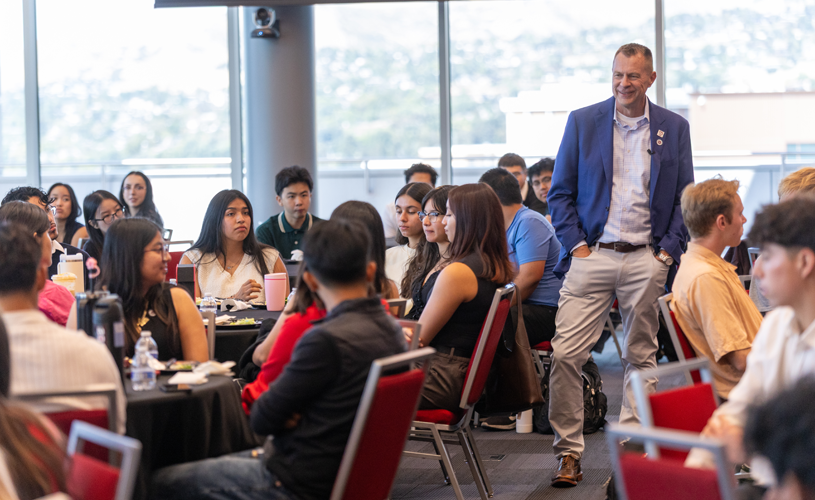at the University of Utah
Dean Dirks encourages Opportunity Scholars to find and forge mentor relationships
Mentorship is a fundamental component of the Opportunity Scholars, a program dedicated to supporting the educational experiences of first-generation students at the David Eccles School of Business.
Kurt Dirks, dean of the Eccles School and keynote speaker at the most recent Opportunity Scholars Speaker Event, noted that as a first-generation college graduate himself, he knows just how transformative having mentors can be.
A well-known part of Dirks’ personal story is that he grew up on a farm in rural Iowa and went from a high school graduating class of 25 students to a 25,000-student campus at Iowa State University. A lesser-known component that he revealed to the Opportunity Scholars, though, is that he struggled in the early days of his higher education.
“I had no idea how to navigate the system,” said Dirks. “… I did a lot of dumb stuff. As an undergraduate, I [initially] had no idea what I was doing.”
Fortunately, he had an aunt who worked as an administrative assistant in Iowa State’s Ivy College of Business, and whenever he found himself in need of advice, she was there to help him get and stay on track.
Dirks went on to earn his undergraduate degree and got a job working for a small healthcare services firm. After working there for three years, however, he came to the realization that he was lacking both passion and purpose.
He returned to Iowa State to get his master’s degree but was still unsure of his path forward. His aunt helped to guide him again when she suggested he meet Max Wortman, telling him simply that she thought he’d find the professor of management interesting.
“That became another turning point in my life,” said Dirks. “Max said, ‘Why don’t you come work for me?’ I discovered through Max the vibrancy of academia. I loved the classroom, I loved the research I was doing with Max. He saw a little bit of that in me.”
Wortman not only helped Dirks navigate his master’s degree, but also pointed him the direction of his next academic pursuit, suggesting he enroll at the University of Minnesota to learn from Larry Cummings, professor of strategic management and organization, while working on his Ph.D.
Dirks said that Cummings would become “perhaps the person who changed my life the most,” noting that the professor challenged the way he thought and learned, and gave him critical feedback on his work, but always picked him back up and gave him words of encouragement. Though Cummings tragically died a short time before Dirks completed his dissertation, others would step up to fill the void in the coming years.
Yet another mentor suggested some years later that he make the transition from Simon Fraser University in Vancouver, British Columbia to Washington University in St. Louis — a place he’d come to call home for about a quarter-century.
After a few years there, the dean of the Olin Business School at WashU suggested that Dirks leave the classroom and take on an administrative position, something he was initially reluctant to do.
“It opened up a new path for me — things at the time that I did not think I wanted to do,” said Dirks. “But he talked me into trying it.”
That set him up to eventually become the dean of the Eccles School in July 2024.
Dirks noted that he maintains some of those crucial relationships to this day, and still seeks advice from many of the mentors he’s gained along the way. After challenging the Opportunity Scholars in the room to find and forge relationships with their own mentors, he left them will several suggestions.
He pointed out that while having one mentor is good, having several is better, as no single person can provide you with every bit of help that you need in life. Students should not be afraid to ask mentors for help (most people are willing to help you if you ask), but it’s not enough only to reach out when assistance is needed; they should stay in constant contact, let their mentors know how they’re doing, and remember that life is about reciprocity. He also told the Opportunity Scholars to remember that while mentors can be a big influence, students ultimately must forge their own path.
“I would encourage you to not imitate but emulate,” said Dirks. “That person who you look up to, you can never be that person, should never be that person, because you are unique. But you can learn from them.”
The goal of the Opportunity Scholars program at the Eccles School is to support and enhance the educational experience of first-generation business students as they progress toward graduation. For more information, visit Eccles.Link/opportunity-scholars.





